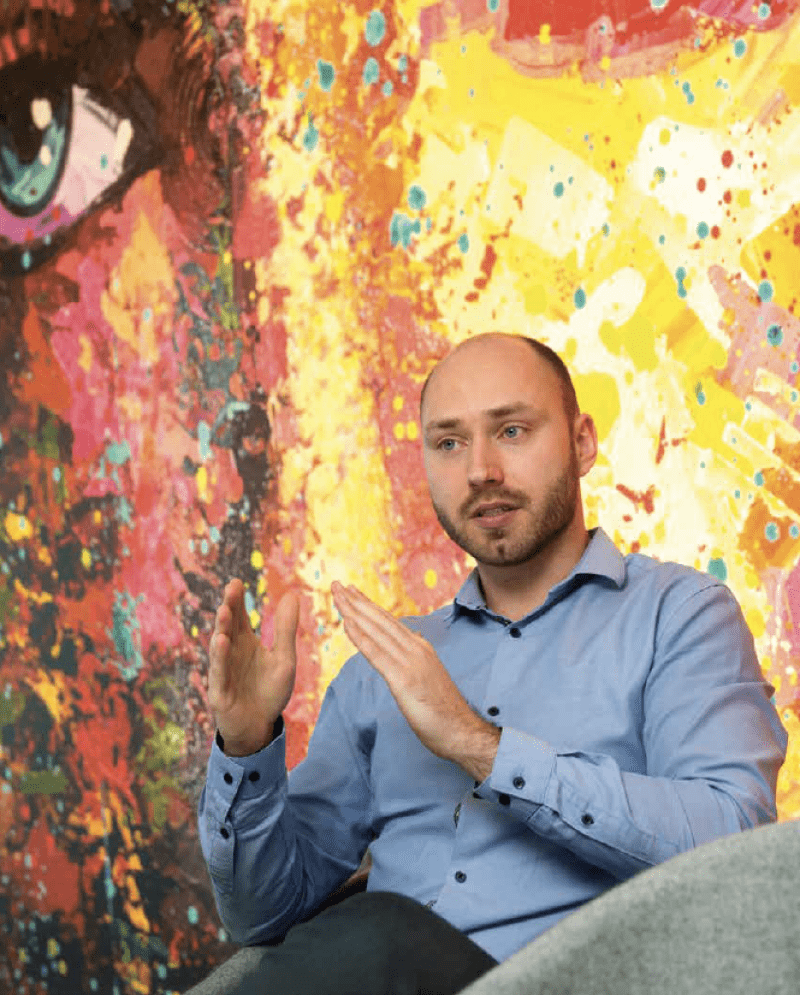AM Group in CFO magazine
2021/03/04

Both companies had an accounting department in the past, where Niels Zutterman, current CFO, then shuttled between the two as financial manager. "The title CFO was given to me with the arrival of the holding company but the title is also just the title. It doesn't tell me that much, to me it's much more about the content," he says. Zutterman joined Absolute Jobs after working at Deloitte for five years. "Back then, it was still in Gistel. I immediately clicked with CEO Kris Ramboer and look so many years later here we are." AM Group is led by Kris Ramboer (Absolute Jobs) and Emmanuel Bekaert (Maxicon). Apart from them, Johan Verhelst (Verhelst Group) and Pieter De Poorter (Group Monument) also sit on the Board of Directors. Within A.M Group, you also have AbsoluteYOU. Here, Jens Sys and Glenn Hoorelbeke are responsible for the daily ins and outs as managing directors.
"In a corona-free year, we achieve a consolidated turnover of 50 million euros turnover. AM Group employs an average of 675 FTEs, 175 at Maxicon, 500 at Absolute Jobs. Of these, apart from myself, three people work in our finance department. Finance has been centrally managed since the creation of the holding company but the seven entities do have their freedom. We are primarily a support function where we are responsible for controls, risk monitoring and correct reporting.
WHAT WERE THE FINANCE CHALLENGES IN ESTABLISHING THE HOLDING COMPANY?
"The challenge was mainly on a human level. It was very important to be transparent towards people and to point out that something new is not always a danger. From change, people sometimes dare to crawl into their shells. Every accountant worked in his/her way, so we had to look at the procedures and make short work of the differences. Everything was put into roadmaps and we also reviewed our main suppliers, too. In the finance department, there is no longer any difference between Absolute and Maxicon. So in all areas we now have uniformity and that saves a lot of discussions in the long run. We are now four months on and there is laughter in the office again. Everything has been digested well and everyone is on the same page."
HOW DO YOU GET THE UNIFORMITY IN?
"We first mapped everything out. I can say from my desk that everything will run differently from tomorrow but experience shows that if you don't start from the problem, it doesn't work. By properly analysing the problems, we started working out procedures, workflows and checklists and structuring them properly. We realised the scripts and workflows entirely in OneNote. Transparent and secure, and only I can make changes to the document to make sure the document does not take on a life of its own. The document is central and when we close we use the checklist provided for that purpose and do not report until everything has been ticked off. For example, when starting up a new office, we have also designed a roadmap: who is going to register the branch unit, who is going to apply for insurance, who is going to do the lease contract, who is going to prepare the periodic assignment, the lease guarantee documents, ... This is all fixed today. For us, the biggest challenge here is to process everything analytically in an efficient way. For that, you need to know and understand the business, so that still involves manual intervention."
WHAT DOES REPORTING LOOK LIKE?
"For the group, we work with Bright Analytics and we are in a business where we mainly sell hours. So reporting is pretty much based on 'hourly billing'. We can see down to the level of a temp or at the level of where we outsource someone, how much gross margin there is. The gross margin, not only of the total business unit, but also down to the lowest level, is a very important KPI for us. So we start from our turnover and move towards the gross margin so that we know concretely what we are earning from someone. In addition, the contribution of each business unit is also an important indicator for us. We analytically keep track of everything so we can see perfectly how much profit, or loss, an office brings us. Of course, EBITDA also tells us a lot, as does the cash flow statement. After all, for us too, revenue is vanity, profit is sanity and cash is king. And during the corona crisis even more than ever. We are not the company that wants to come out as the biggest. We are about the hard facts, the cash flow generated."
WITHIN WHAT TIME FRAME DO THE COMPANIES REPORT?
"The operational reporting is synchronised every night and we can access it through our dashboards. The financial reporting is monthly. We do have set permissions in that reporting to give the right permissions to the employees. So we mainly put our time into analysing the data daily rather than sitting around the table and using heavy pivot tables. The days of 100 KPIs are long gone and we look at what is really important to us. For our sales, for example, there is a module that serves as a cockpit. There, we work with a simple widget that colours red, orange or green. Everything behind it is structural data. So simple for the sales staff so they immediately know whether they are doing well or not. After all, experience shows, the more you put into those dashboards, the less people look at them."
DOES CONSOLIDATING THE VARIOUS ENTITIES CAUSE DIFFICULTIES?
"In principle, the consolidation process is always a difficulty but we are in Bright Analytics with an intercompany recognition module. The intercompanies are extracted automatically. Where they are not, we still assign the IC code ourselves in the booking lines. We can eliminate all intercompanies in one click. In principle, consolidation is quite a task, but we can start to extract ICs very quickly and automatically. That still leaves some manual entries, for example eliminating the associates and determining the consolidation difference. It takes us about two days to capture the data according to the closing process."
DO YOU STILL BUDGET?
"Yes, our budget is progressive on the one hand and there is still a piece of manual input. The costs in our sector are mainly recurrent: licences in IT, office rental costs, ... In addition, our biggest investment is human capital. Our turnover is done in consultation with the various commercial managers. The costs are relatively quick to identify, the major part is recurrent and we can automatically budget with a percentage deviation. We annually forecast the 12 months on the basis of the known budget. Each time, we supplement the actuals with the budgeted figures. In this way, we can forecast again and again until the end of the year, so there are never any surprises. The actuals never differ much from the budget. Of course, we have been in the sector for years, so we are comfortable with our budget."
WHAT CHALLENGES ARE YOU FACING SECTOR-WISE?
"Our core business with Absolute Jobs is temping in workers. Then we also bring cross-border workers to our country. We are also known for this. If local construction companies cannot find the bricklayer on the local labour market, we go the extra mile by looking across the border for the right profile to fill the vacancy. There, of course, we are faced with the legal framework in Belgium towards housing. Shared housing is still in its infancy in Belgium, there is barely a legal framework for it. Our neighbour the Netherlands is much more advanced in this respect. This is a real challenge, because how should we respond to it? As finance, we really try to put our finger on that wound in our reporting and demonstrate certain trends even before they are noticed. At the moment, for example, we are turning a sharply reduced turnover on nationalities other than Belgians. Where we would otherwise get more than 50 per cent of our turnover from other nationalities, we are now noticing an immense shift there due to the corona crisis. Foreign workers are less eager to work here because of the Covid measures. We also see that at Maxicon, in the retail sector, turnover is climbing sharply. Maxicon Retail places people in the supermarket to cope with the busy peaks. There, we then see opposite movements."
ARE THERE ANY RISKS FOR THE FINANCE DEPARTMENT TO THE LEGISLATIVE FRAMEWORK FOR CROSS-BORDER WORKERS?
"No, because of course we know the legal framework. Everyone in our company knows those by the way, and we don't have to do risk management for that. We can't change much about the law. We know the boundaries of the playing field and we have to do it within that. But that is for everyone in our industry.
YOU SAID EARLIER: CASH IS KING, EVEN MORE SO DURING THE CORONA CRISIS. WHAT IMPACT DOES THIS HAVE ON CREDIT MANAGEMENT?
"In credit management, we work with the iController software. In this, debtor management is largely automated. There is a predefined workflow in our system that keeps us informed of our to do's on a daily basis. In the very beginning, we checked the aging balance to see which of our customers we needed to contact. During the corona crisis, we deliberately stepped up a gear. Both in terms of time commitment and procedures. We don't want any more delays in payment processes. We are hard on facts but soft on people. If the customer himself indicates that he is in trouble, we give him/her the options of a repayment plan provided there are additional securities. We have been flexible about it and it has paid off. The customers who stuck their heads in the sand, we are ruthless about that. We may not make ourselves popular with them but it is not for us to act as a bank during this crisis."
HOW DO YOU FLAG THOSE RISKS?
"We have a preventive receivables policy and work very strongly on credit scores and limits. The sales staff are given carte blanche but from a negative score they have to have a prior agreement from the F&A team. This means that we ourselves go and check the financial creditworthiness, audit the financial statements and check the background of the directors. In the end, there are always ways to work together with a hedged risk but we always check the situation beforehand. With clients we already work with, there is always a possibility of a negative situation arising as well. That is why the limits are also adjusted regularly."
WHAT DOES THE FUTURE OF THE FINANCE TEAM LOOK LIKE?
"Now there are only pure accountants in our team. I could already categorise into 'cubicles' but I deliberately don't. Depending on our growth, we will look more at dedicated employees. The controller who would run here today would look completely different should the company turn 100+ million euro turnover. That's why I see the broad range of tasks now as an enrichment within our team, and I think it's also one of the reasons people like working here. We should definitely surf on that. But depending on growth, I don't rule out our team attracting new people."
Source: De Boysere, N. (2021). Financial Media CFO Magazine.
Image: Jerry De Brie, Financial Media CFO Magazine

